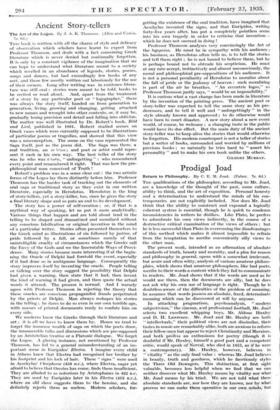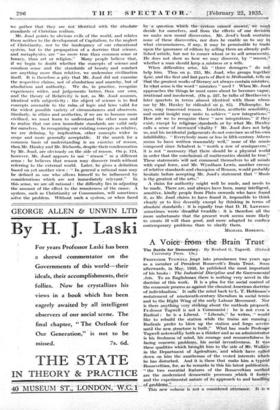Prodigal Joad
Return to Philosophy. By C. E. M. Joad. (Faber. 7e. 6d.)
THE qualifications of the philosopher, according to Mr. Joad, are a knowledge of the thought of the past, some culture, ability to think, and the art of exposition. Personal honesty and a determination to understand the minds of his con- temporaries . are not explicitly included. Nor does Mr. Joad think that the 'ability, to construct and expound a logically coherent system is essential, though he is quick to condemn inconsistencies in writers he dislikes. Like Plato, he prefers to adumbrate his own views indirectly, in the course of a destructive critical examination of the views of others : but he is less successful than Plato in overcoming the disadvantages of this method which makes it almost impossible to refrain from the temptation to ascribe conveniently silly views to the other man.
The present work, intended as an affirmation of absolute standards of truth, beauty and morality, and a plea for reason and philosophy in general, opens with a somewhat irrelevant, but acute and often witty, analysis of various amateur philoso- phies, which shows that amateur philosophers, like bad poets, ascribe to their words a content which they fail to communicate to readers. Mr. Joad shows that if the words are used as he would use them, then the documents are silly, but he does not ask why his own use of language is right. Though he is doubtless aware of the difficulties of the problem of meaning, he assumes that words possess an absolute, fixed, determinate meaning which can be, discovered at will by anyone.
In attacking pragmatism, psychoanalysis, "modern subjectivism," the cinema, and professional football, Mr. Joad selects two excellent whipping boys, Mr. Aldous Huxley and D. H. Lawrence. Mr. Joad and Mr. Huxley are both "intellectuals," their political views are not dissimilar, their tastes in music are remarkably alike, both are anxious to reform their fellow-men but appear to reject Christianity and Marxism, and both pidess in enthusiasm for poetry (though it is doubtful if Mr. 'Huxley, himself a good poet and a competent critic, would speak of Nerval, who died in 1855, as if he were a, contemporary). Mr. Huxley, however, believes in " vitality " as the only final value : whereas Mr. Joad believes in beauty, truth and goodness, 'which he facetiously styles the Three Old Dowagers. This distinction, at first sight valuable, becomes less helpful when we find that we can neither discover what Mr. Huxley means by vitality nor what Mr. Joad means by his triad. We are not told what these absolute standards are, nor how they are known, nor by what process we can make them operative in our own minds, but we gather that they are not- identic.al *Rh 'the absolute standards of Christian realism.
Mr. Joad points to obvious evils of the world, and relates them neither to the development of Capitalism, to the neglect of Christianity, nor to the inadequacy of our educational system, but to the propagation of a doctrine that science, and metaphysics, are "no more true than common sense or lunacy, than art or religion." Many people believe that, if we begin to doubt whether the -concepts of science and cominon sense and the standards of beauty and conduct are anything more than relative, we undermine civilization itself. It is therefore .a pity that Mr. Joad did not examine the respective claims, not of absolutism' and anarchy, but of absolutism and authority. We do,' in practice, recognize experiences wider, and judgements better, than our own, and the theory of Relativity is not, as Mr. Joad assumes, identical with subjectivity : the object of science is to find concepts amenable to the rules, of logic and laws valid for the widest possible variety of circumstances and observers. Similarly, in ethics and aesthetics, if we are to become more civilized, we must learn to understand the other man and to realize that our own- immediate standards are valid only for ourselves. In recognizing our existing concepts as relative, we are defining, by implication, other concepts wider in scope and more generally acceptable. If the search for a common basis of understanding is an exercise of reason, then Mr. Huxley and Mr. Richards, despite their condemnation by Mr. Joad, are obviously on the side of reason. On P. 124, however, Mr. Joad appears to use reason" iii a different sense : he believes that reason may discover truth without referring to the external world. Later, he gives a definition based on yet another view : "In general a rational man may be defined as one who allows himself to be influenced by considerations which are not immediately relevant." In this sense, we are all rational : the difficulty lies in adjusting the amount of the effect to the remoteness of the cause. A system, such as Christianity or Communism, will sometimes solve the problem. Without such a system, or when faced lay' a :qtlestion *hieli the- 4.3Yttem- cannot answer,' we must decide for ourselves, and from the effects of our decisiOn we make new moral discoveries. Mr. Joad's book contains none of these discoveries, nor does he enable us to say in what circumstances, if any, it may be permissible to trade upon the ignorance of editors by selling them an already puli-' lished-article, but not to corner wheat or to sell armament. He does not show us how we may discover, by "reason,' whether a man should Acep.arnistress or a wife. When difficulties arise, his "three dowagers" do in4 help him. Thus on p. 235, Mr. Joad, who groups together *I4ear, and the first and hat parts of Back to Methuselah, tells u;i: :that the greatest works of literary art always contain mistakes. In what sense is the word-'!' mistakes " used ? When Mr. Joad approaches the things he most cares about he becomes vague; irrational and incoherent. (On p. 287, he talks of Beethoven's later quartets in terms .almost identical with, those whose use by Mr. Huxley he ridiculed 'On. P. 85). Philosophy, he :says, May transcend reason. Intuition, aesthetic sensibility; and moral insight may unite to achieve "new integrations." How iir'e we to recognize these "new integrations," if they exist; except by religioentAandards or by. what Mr. Huxley calls a sense of increased' vitality ?' Mr. Joad does not help us, and his incidental judgements do not convince us of his own infallibility. "Everybody More or less in fifth-century Athens
seems to have written reasonably well," none of the music _ .
composed since Schubert is "worth a row of semiquavers," it is not "necessary -that there should be a physical world in order that the conclusion i of mathematics shOnld be true:' These statements will net commend themselves to all minds with equal force, and Mr. Wyndham Lewis, another enemy of relative standards and champion of Reason, Would probably hesitate before accepting Mr. Joad's statement that Music is the greatest of the arts."
A claim for authority might well be made, and needs to be made. There are, and always have been, many intelligent, sensitive, kindly people from Plato onwards who have found it, as Mr. Joad olaims to have found it, impossible to think clearly; or to live decently except by thinking in terms of absolute-- Standards it is equally true that D. H. Lawrence sometimes rivrote -dreadful twaddle: it is therefore all the - .more unfortunate that the present work seems more likely to create ill will than good, and more adapted to' confuse contemporary problems than to clarify them.
_ MICILkEL ROBERTS.



















































 Previous page
Previous page